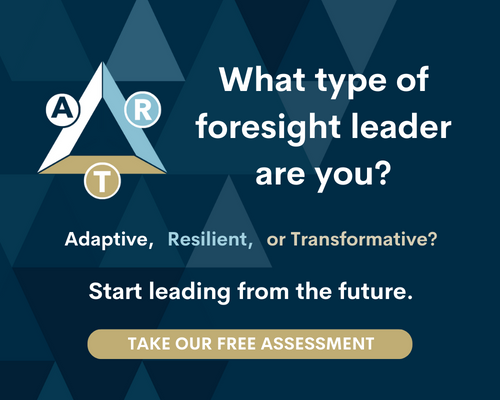3 Ways to a Fearless Future

What Got Us Here Won’t Get Us There
Legacy leadership development isn’t positioned to fully address the changing and emerging needs of 21st-century leaders in businesses, government, or society. Such theory-based curriculum fails to provide real-world applicability and relies on Industrial Age thinking that reinforces static approaches. The world is much more complex now, and today’s leaders must be active change agents that are empowered to continually create the future today.
Leadership development in this environment should be much more than a training program; it must be a culture shift that creates powerful value and action. Integrating “futures thinking” into development efforts ensures leaders will become more adaptive, resilient, and transformational (ART) – adopting the cycle of “learn, unlearn, and relearn” rather than attempting to layer new ideas over existing, dated perspectives.
What Makes These 2,000 Leaders Tick?
To understand how successful leaders are not just coping with disruption but thriving in it, in 2017, we interviewed futures-empowered individuals from across the globe representing a diverse set of industries. From these conversations and additional research, we developed a global leadership assessment to ignite conversations and approaches to future-proofing leadership development.

Since then, nearly 2,000 individuals have completed the ART Leadership Assessment, and we have gathered key insights into these essential leadership traits. The results show 50% of participants are adaptive, 35% resilient, and 15% transformative.

Leading With ART
While it is tempting to retreat into a reactionary, fear-based operational model given our changing world, this is actually the least effective strategy. We must first discover where our natural strengths lie. Then, we can explore the strengths and weaknesses of each of the three leadership traits. Success in our complex world requires us to understand the art of embodying and leveraging all three traits.
- Leaders who are assessed as “adaptive” should be proud of their ability to adapt, but in the volatility of our current environment, this constant shifting can be exhausting.
- Resilient leaders are often a calming force in a sea of change and disruption but could benefit from being more agile and flexible.
- Transformative leaders are revolutionary thinkers who aren’t afraid to challenge the status quo but sometimes lack a clear path to achieve their vision.


Angela Cring
Learning & Development Specialist, TFSX
Angela brings a diverse background in physical sciences and nonprofit/event management, as well as 20+ years of trusted strategic planning, change and brand management expertise across industries. During her career, she has harnessed her combined superpowers of a future-focused, transformational mindset and well-honed analytical skills to build consensus within teams, move projects forward, and successfully achieve goals.
Her deep curiosity blends her passions for science and creativity, allowing her to help clients make continuous improvements by using both qualitative/analytical and creative/intuitive approaches. She finds joy in helping others imagine unseen and alternative possibilities to make better decisions today.

